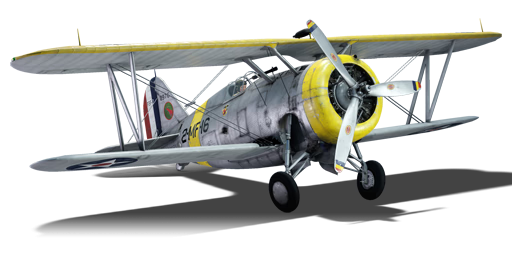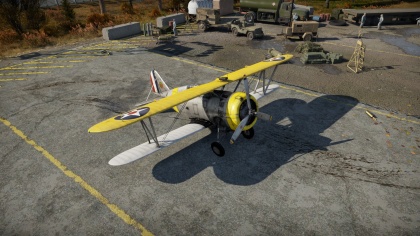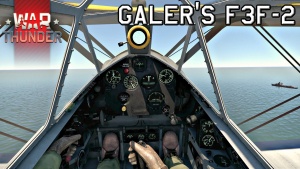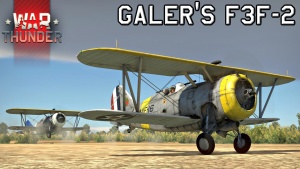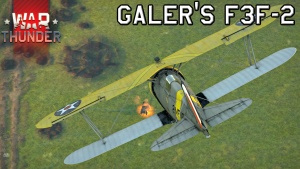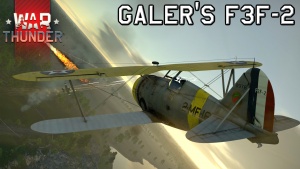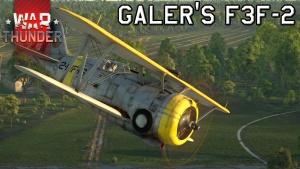Difference between revisions of "Galer's F3F-2"
bacongaming (talk | contribs) (Added screenshots of the subject aircraft) (Tag: Visual edit) |
bacongaming (talk | contribs) (→Usage in battles: edited pros and cons section) (Tag: Visual edit) |
||
| Line 170: | Line 170: | ||
As for using the F3F for close air support (CAS) you will have a few possibilities, the most popular choice will be to take the two 100lb bombs (AN-M30A1), these only contain 24.5kg of explosive mass so you will need to land them very close to the intended target to do any meaningful damage. A second option is to use your .50cal (12.7mm) Browning M2 machine gun to destroy ground targets, all belts for this gun have 26mm of penetration, although the ground targets belts are best as they contain more AP rounds, these will be able to go through SPAA (Self Propelled Anti Aircraft) vehicles as well as some light & medium tanks, firing for the upper armour or side armour on enemy vehicles will usually prove to be the most effective way of going through enemy armour. | As for using the F3F for close air support (CAS) you will have a few possibilities, the most popular choice will be to take the two 100lb bombs (AN-M30A1), these only contain 24.5kg of explosive mass so you will need to land them very close to the intended target to do any meaningful damage. A second option is to use your .50cal (12.7mm) Browning M2 machine gun to destroy ground targets, all belts for this gun have 26mm of penetration, although the ground targets belts are best as they contain more AP rounds, these will be able to go through SPAA (Self Propelled Anti Aircraft) vehicles as well as some light & medium tanks, firing for the upper armour or side armour on enemy vehicles will usually prove to be the most effective way of going through enemy armour. | ||
| − | It is recommended not to hold the | + | It is recommended not to hold the brakes on landing, as the F3F will likely flip over, it is best to tap the breaks on and off to avoid this occurring. |
[[File:Galer's F3F screenshot 3.jpg|thumb]] | [[File:Galer's F3F screenshot 3.jpg|thumb]] | ||
| Line 248: | Line 248: | ||
* Very low stalling speed | * Very low stalling speed | ||
* Extremely control responsive aircraft | * Extremely control responsive aircraft | ||
| + | * 12.7mm MG can be used to destroy light ground targets | ||
| + | * Climbrate is competitive against aircraft of similar BR | ||
'''Cons:''' | '''Cons:''' | ||
| Line 254: | Line 256: | ||
* Low ammunition count for the .50 cal | * Low ammunition count for the .50 cal | ||
* Bright paint scheme makes it harder to stay hidden | * Bright paint scheme makes it harder to stay hidden | ||
| + | * Can flip on landing with continued brake use | ||
== History == | == History == | ||
Revision as of 18:24, 29 March 2020
Contents
| This page is about the premium aircraft Galer's F3F-2. For the regular version, see F3F-2. |
Description
The Galer's F3F-2 is a premium rank I American fighter
with a battle rating of 1.3 (AB/RB/SB). It was introduced in Update 1.69 "Regia Aeronautica". The plane is painted after the camouflage scheme of American pilot Bob Galer in the USMC, whose plane can be viewed today at the National Naval Aviation Museum.
General info
Flight Performance
The F3F-2 is a highly manoeuvrable aircraft as would be expected from its biplane configuration, this allows it to competitively turn with majority of the enemy aircraft that it encounters, the energy retention is good at lower speeds (<250km/h), but at higher speeds the F3F-2 will lose energy quickly when in a hard turn, problems will be found when facing higher BR monoplane fighters which will have a considerably superior top speed this can cause problems due to the slower speed of the F3F.
Despite the slower speed of the F3F-2 it does have good early acceleration (0-240km/h) and will usually be one of the first aircraft in the air at the start of the match thanks to its 210m needed takeoff distance, the 16m/s climb rate will also allow for the F3F-2 to have an altitude against majority of the enemy fighters that it will face.
| Characteristics | |||||||
|---|---|---|---|---|---|---|---|
| Stock | |||||||
| Max Speed (km/h at 4,268 m) |
Max altitude (meters) |
Turn time (seconds) |
Rate of climb (meters/second) |
Take-off run (meters) | |||
| AB | RB | AB | RB | AB | RB | ||
| 411 | 404 | 10120 | 15.8 | 16.1 | 10.4 | 12.5 | 210 |
| Upgraded | |||||||
| Max Speed (km/h at 4,268 m) |
Max altitude (meters) | Turn time (seconds) | Rate of climb (meters/second) |
Take-off run (meters) | |||
| AB | RB | AB | RB | AB | RB | ||
| 461 | 436 | 10120 | 14.3 | 15.0 | 24.3 | 16.0 | 210 |
Details
| Features | ||||
|---|---|---|---|---|
| Combat flap | Take-off flap | Landing flap | Air brakes | Arrestor gear |
| X | X | X | X | ✓ |
| Limits | ||||
|---|---|---|---|---|
| Wing-break speed (km/h) |
Gear limit (km/h) |
Combat flap (km/h) |
Max Static G | |
| + | - | |||
| 810 | 320 | N/A | 7 | 2.5 |
| Optimal velocities | |||
|---|---|---|---|
| Ailerons (km/h) |
Rudder (km/h) |
Elevators (km/h) |
Radiator (km/h) |
| < 320 | < 390 | < 350 | > 308 |
| Compressor (RB/SB) | ||
|---|---|---|
| Setting 1 | ||
| Optimal altitude | 100% Engine power | WEP Engine power |
| 1,600 m | 850 hp | 952 hp |
| Setting 2 | ||
| Optimal altitude | 100% Engine power | WEP Engine power |
| 4,214 m | 750 hp | 840 hp |
Survivability and armour
- 8.5 mm steel boxes in the rear fuselage
- Critical components located in front of aircraft (fuel, pilot, engine, controls)
- Two self-sealing fuel tanks located in the fuselage
Armaments
Offensive armament
The Galer's F3F-2 is armed with:
- 1 x 12.7 mm Browning M2 machine gun, nose-mounted (200 rpg)
- 1 x 7.62 mm Browning machine gun, nose-mounted (500 rpg)
Suspended armament
The Galer's F3F-2 can be outfitted externally with:
- Without load
- 2 x 100 lb AN-M30A1 bombs (200 lb total)
Usage in battles
The F3F is first and foremost a fighter aircraft, this is a role in which it thrives with its brilliant manoeuvrability allowing it to deal with majority of enemy aircraft in a turn fight, trying to get an enemy aircraft to turn with you will be the best way to engage and win a fight, if the enemy is a monoplane they will usually have worse performance at slower speeds, so making them turn and lose energy is a good way to gain an advantage with your superior slow speed performance, if the enemy aircraft is also a biplane your main focus should be preventing them from getting guns onto your aircraft, if you can gain a turning advantage you should move into position and attempt to down the enemy aircraft, your two guns can end up putting lots of rounds into an enemy, but a hit to any critical component such as the pilot or engine will either end the fight or put it strongly in your favour. It is best to avoid "head on" engagements with enemy aircraft, as the engine on the F3F has a large frontal profile (Radial engine) along with the engine front being exposed, this makes the engine being hit a common occurrence and without your engine survival is unlikely.
The F3F will commonly come across aircraft with superior top speed, such as many of the early Bf-109 variants (A,B-1,E-1 & F-1), these aircraft will usually attempt to use a "boom & zoom" attack style against your aircraft, the best you can do is to keep a good amount of energy and be ready to evade when the commit to an attack run, if you can evade them for long enough you will hopefully receive some help from some of your other team members or you might be able to make the enemy try and commit to a turn fight where you should have an advantage and be able to critically damage or down their aircraft.
As for using the F3F for close air support (CAS) you will have a few possibilities, the most popular choice will be to take the two 100lb bombs (AN-M30A1), these only contain 24.5kg of explosive mass so you will need to land them very close to the intended target to do any meaningful damage. A second option is to use your .50cal (12.7mm) Browning M2 machine gun to destroy ground targets, all belts for this gun have 26mm of penetration, although the ground targets belts are best as they contain more AP rounds, these will be able to go through SPAA (Self Propelled Anti Aircraft) vehicles as well as some light & medium tanks, firing for the upper armour or side armour on enemy vehicles will usually prove to be the most effective way of going through enemy armour.
It is recommended not to hold the brakes on landing, as the F3F will likely flip over, it is best to tap the breaks on and off to avoid this occurring.
Manual Engine Control
| MEC elements | ||||||
|---|---|---|---|---|---|---|
| Mixer | Pitch | Radiator | Supercharger | Turbocharger | ||
| Oil | Water | Type | ||||
| Controllable | Controllable No automatic pitch |
Not controllable | Controllable Has automatic mode |
Separate | Controllable 2 gears |
Not controllable |
Modules
| Tier | Flight performance | Survivability | Weaponry | |||
|---|---|---|---|---|---|---|
| I | Fuselage Repair | Radiator | Offensive 7.62 mm belts | |||
| II | Compressor | Airframe | Offensive 12.7 mm belts | Mk.41 | ||
| III | Engine | New 7.62 mm MGs | ||||
| IV | Wings repair | Engine Injection | Cover | New 12.7 mm MGs | ||
Pros and cons
Pros:
- Turning circle is very tight
- Very low stalling speed
- Extremely control responsive aircraft
- 12.7mm MG can be used to destroy light ground targets
- Climbrate is competitive against aircraft of similar BR
Cons:
- Small primary armament, inadequate for bombers
- Low ammunition count for the .50 cal
- Bright paint scheme makes it harder to stay hidden
- Can flip on landing with continued brake use
History
Robert E. Galer ditched this aircraft in the ocean in 1940. He went on to become a distinguished Marine Corps aviator in WW2 and the Korean War.
Media
See also
- F3F-2 - the normal tech tree version of the F3F
- Zhukovsky's I-153-M62 - similar Soviet aircraft
External links
Paste links to sources and external resources, such as:
- topic on the official game forum;
- encyclopedia page on the aircraft;
- other literature.
| Grumman Aircraft Engineering Corporation | |
|---|---|
| Aircraft | |
| Fighters | |
| F3F | F3F-2 · Galer's F3F-2 |
| F4F Wildcat | F4F-3 · F4F-4 |
| XF5F Skyrocket | XF5F · XP-50 |
| F6F Hellcat | F6F-5 · F6F-5N |
| F7F Tigercat | F7F-1 · F7F-3 |
| F8F Bearcat | F8F-1 · F8F-1B |
| Jet Fighters | |
| F9F Panther/Cougar | F9F-2 · F9F-5 · F9F-8 |
| F-11 Tiger | F11F-1 |
| F-14 Tomcat | F-14A Early · F-14B |
| Jet Strike Aircraft | |
| A-6 Intruder | A-6E TRAM |
| Bombers | TBF-1C |
| Export | ▄Martlet Mk IV · ▄F6F-5 · ▄F6F-5N · ▄F8F-1B · ▄Avenger Mk II · ▄Hellcat Mk II |
| ▄F-14A IRIAF | |
| Naval Vehicles | |
| Patrol Gunboat Hydrofoil (PGH) | USS Flagstaff |
| USA fighters | |
|---|---|
| P-26 Peashooter | P-26A-33 · P-26A-34 · P-26A-34 M2 · P-26B-35 |
| P-36 Hawk | P-36A · Rasmussen's P-36A · P-36C · ○P-36C · P-36G |
| P-39 Airacobra | P-400 · P-39N-0 · P-39Q-5 |
| P-40 | P-40C · P-40E-1 · P-40E-1 TD · P-40F-10 |
| P-43 Lancer | P-43A-1 |
| P-47 Thunderbolt | P-47D-22-RE · P-47D-25 · P-47D-28 · P-47M-1-RE · ⋠P-47M-1-RE · P-47N-15 |
| P-51 Mustang | P-51 · P-51A (Thunder League) · P-51C-10 · P-51D-5 · P-51D-10 · P-51D-20-NA · P-51D-30 · P-51H-5-NA |
| P-63 Kingcobra | P-63A-5 · P-63A-10 · P-63C-5 · ␠Kingcobra |
| Prototypes | XP-55 |
| F2A Buffalo | F2A-1 · Thach's F2A-1 · F2A-3 |
| BF2C | BF2C-1 |
| F3F | F3F-2 · Galer's F3F-2 |
| F4F Wildcat | F4F-3 · F4F-4 |
| F4U Corsair | F4U-1A · F4U-1A (USMC) · F4U-1D · F4U-1C · F4U-4 · F4U-4B · F4U-4B VMF-214 · F2G-1 |
| F6F Hellcat | F6F-5 · F6F-5N |
| F8F Bearcat | F8F-1 · F8F-1B |
| Other countries | ▃Ki-43-II · ▃Ki-61-Ib · ▃A6M2 · ▃Bf 109 F-4 · ▃Fw 190 A-8 · ▃Spitfire LF Mk IXc |
| USA premium aircraft | |
|---|---|
| Fighters | Thach's F2A-1 · Galer's F3F-2 · F2G-1 · F4U-4B VMF-214 · P-26A-34 · Rasmussen's P-36A · P-40C · P-43A-1 |
| P-47M-1-RE · ⋠P-47M-1-RE · P-51A · P-51D-10 · P-51D-20-NA · ␠Kingcobra · XP-55 | |
| ▃A6M2 · ▃Ki-43-II · ▃Ki-61-Ib · ▃Bf 109 F-4 · ▃Fw 190 A-8 · ▃Spitfire LF Mk IXc | |
| Twin-engine fighters | XP-38G · Bong's P-38J-15 · P-38K · YP-38 · P-61A-11 · XF5F · XP-50 · F7F-3 |
| Jet fighters | P-59A · F-86F-35 · F-89B · F-89D · F-4S Phantom II · F-5C · F-20A |
| Strike aircraft | A-1H · A2D-1 · AU-1 · XA-38 · AV-8A · AV-8B (NA) · A-6E TRAM · A-10A |
| Bombers | A-26C-45DT · B-10B · BTD-1 · PBM-3 "Mariner" · PBM-5A "Mariner" · PV-2D |


